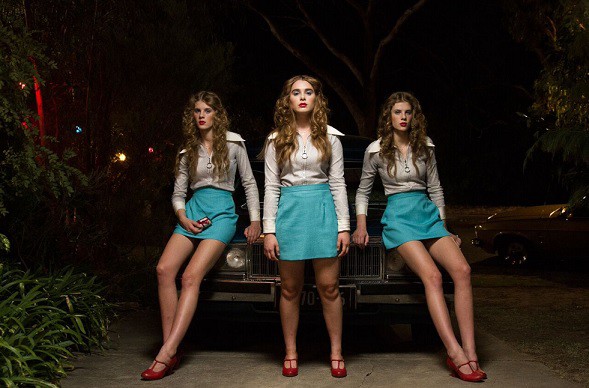Rosemary Myers is the Artistic Director of Windmill Theatre, an award-winning national performing arts company based in Adelaide, South Australia. Her directing credits for Windmill include the multi-award-winning “Pinocchio,” “The Wizard of Oz,” “Fugitive,” “Big Bad Wolf,” and “Girl Asleep.” A multi-Helpmann Award-nominated director, her productions regularly visit leading stages and festivals around Australia and the world, including the Sydney Opera House, Melbourne’s International Comedy Festival, and New York City’s New Victory Theatre. “Girl Asleep” is Myers’ feature film debut.
“Girl Asleep” opens in LA September 23 and NY September 30.
W&H: Describe the film for us in your own words.
RM: The film is set in the ’70s and tells the story of Greta Driscoll, who is painfully shy. When her parents decide to throw her a 15th birthday party the events of the evening escalate from bad to worse, and send Greta into a parallel world.
The film is stylized and playful storytelling. We often describe it as a journey into the dark heart of the teenage mind, but it is also very funny.
W&H: What drew you to this story
RM: I’ve worked a lot with designer Jonathan Oxlade and writer Matthew Whittet at Windmill Theatre in South Australia. We created a trilogy of theater shows — works exploring the teenage experience — and “Girl Asleep” was the third part of that trilogy. We decided to adapt it into a film.
We find this time of adolescence to be such a fertile period of life for storytelling. It is a time of transformation — there are high stakes, and these years are full of so much possibility: You’re asking big questions about identity and social order. Most people can relate to this time — you either are, have been, or will be a teenager.
W&H: What do you want people to think about when they are leaving the theater?
RM: I think it is quite an empowering experience. The story is grounded in a truthful and brave performance by Bethany Whitmore as Greta. She really captures the vulnerability of that time of life.
We have had some incredible feedback about the way the film can speak to audience members. That is the highest praise for us as a group of art makers and storytellers.
W&H: What was the biggest challenge in making the film?
RM: We shot the film in 22 days, so it was a super tight schedule. It was my first film directing experience and before we started someone said to me, “Anyone who knew what he or she were doing would not attempt to make this film on this budget.” So the whole way through it was a heady combination of exhilaration around what we were creating and overwhelming concern we would not get it finished.
W&H: How did you get your film funded? Share some insights into how you got the film made.
RM: The primary source of funding was through a unique initiative called the Hive. It encouraged artists from outside the screen world — visual artists, choreographers, musicians, and theater makers — to consider making and then pitching a film. It was a very bold initiative and some great screen projects have resulted from it.
W&H: What’s the best and worst advice you’ve received?
RM: Best advice: In filmmaking the cheapest place to make mistakes is on paper.
Worst advice: Be realistic.
W&H: What advice do you have for other female directors?
RM: Back yourself — and back your collaborators, too. When you all have each other’s backs it makes the highs higher and the lows more manageable.
W&H: Name your favorite woman-directed film and why.
RM: “An Angel at my Table,” one of Jane Campion’s earliest films. It’s a deeply moving story and it is very powerfully told.
W&H: Have you seen opportunities for women filmmakers increase over the last year due to the increased attention paid to the issue? If someone asked you what you thought needed to be done to get women more opportunities to direct, what would be your answer?
RM: Just this year in Australia, there have been some major initiatives for women theater makers announced, the biggest being a new strategy by our federal film funding body, Screen Australia, called Gender Matters. It aims to support film and television projects made by and about women. Hopefully it will go some way to address the gender imbalance in Australian filmmaking.
Overall, I think women always need to be aware of and champion other women. I have been fortunate with this this kind of support and opportunity across my career.








